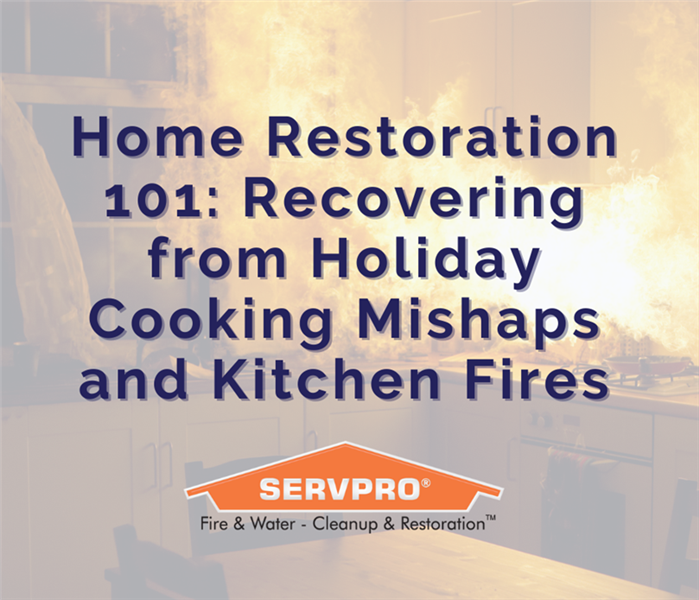Home Restoration 101: Recovering from Holiday Cooking Mishaps and Kitchen Fires
12/4/2024 (Permalink)
 Need help restoring your kitchen after a fire?
As a trusted leader in restoration, SERVPRO of Norwood/West Roxbury has the expertise
Need help restoring your kitchen after a fire?
As a trusted leader in restoration, SERVPRO of Norwood/West Roxbury has the expertise
The holiday season is a time for family gatherings, festive meals, and, unfortunately, a rise in cooking-related fires. With the kitchen busier than usual, accidents can range from minor mishaps to significant kitchen fires. Knowing how to prevent and respond to these situations—and how to recover from any damage—can save you time, stress, and money. Here’s your guide to avoiding holiday cooking disasters and restoring your kitchen if the unexpected occurs.
How to Prevent Holiday Cooking Fires
Before discussing restoration, it’s essential to focus on fire prevention. Here are key steps to reduce the risk:
1. Stay Focused While Cooking
Distractions abound during the holidays, but never leave a hot stovetop or oven unattended. If you need to step away, turn off the heat temporarily.
2. Avoid Loose Clothing
Long sleeves or flowing fabrics can easily ignite. Wear snug clothing or roll up your sleeves to stay safe.
3. Keep Flammable Items Away
Ensure towels, paper towels, and wooden utensils are kept far from open flames or hot surfaces. A clutter-free workspace is safer.
4. Keep a Fire Extinguisher Nearby
Having a kitchen-rated fire extinguisher on hand can stop small fires before they spread. Ensure everyone in the home knows how to use it.
5. Use Caution with Oil and Grease
Grease fires are a common hazard. Keep an eye on hot oil, as it can overheat quickly. If a grease fire starts, never use water—it will spread the flames.
What to Do if a Cooking Fire Happens
Despite precautions, accidents can occur. Follow these immediate steps:
- Turn Off the Heat: Shut off the burner or oven to prevent the fire from spreading.
- Smother the Flames: Cover a small stovetop fire with a metal lid or baking sheet. Avoid using water, flour, or anything flammable.
- Use a Fire Extinguisher if Needed: If the fire grows beyond what you can manage, use an extinguisher and call emergency services.
- Ventilate Safely: Once the fire is out, open windows to clear smoke but avoid using your range hood until it’s inspected.
Recovering from Kitchen Fire or Smoke Damage
If a fire leaves damage in its wake, follow these steps to restore your kitchen:
1. Assess the Damage
Examine the affected areas to determine whether the damage is surface-level or requires deeper cleaning and repairs.
2. Clean Soot and Smoke Residue
- Soot: Use a vacuum with a brush attachment to lift loose soot without smearing.
- Smoke Residue: Clean surfaces with a mixture of water, vinegar, and mild detergent. Rinse thoroughly to remove any residue.
3. Eliminate Lingering Odors
- Ventilation: Open windows and run fans to circulate fresh air.
- Absorb Odors: Use baking soda on fabrics or activated charcoal to neutralize smells.
- Air Purifiers: HEPA filters can help remove airborne particles and odors.
4. Deep Clean Appliances
- Oven and Stovetop: Follow your appliance manual for proper cleaning techniques.
- Vent Hood: Remove and clean grease-laden filters, replacing them if needed.
5. Repair or Replace Damaged Areas
- Cabinets and Counters: Sand and repaint or replace as necessary.
- Flooring: Fire or water damage may require patching or replacing affected sections.
6. Call a Professional for Severe Damage
For extensive damage, professional restoration services can handle tough cleaning and repairs using specialized tools and techniques.
Preventing Future Cooking Mishaps
Keep your kitchen safe year-round by adopting these habits:
- Regularly clean your oven, stovetop, and vent hood to prevent grease buildup.
- Test smoke detectors monthly to ensure they’re functioning.
- Review fire safety procedures with your family so everyone knows what to do in an emergency.
Cooking fires are a common holiday hazard, but with careful precautions and a solid recovery plan, you can enjoy a safe and festive season.
Need help restoring your kitchen after a fire?
As a trusted leader in restoration, SERVPRO of Norwood/West Roxbury has the expertise and tools to get your home back to normal. Call us today for assistance.





 24/7 Emergency Service
24/7 Emergency Service